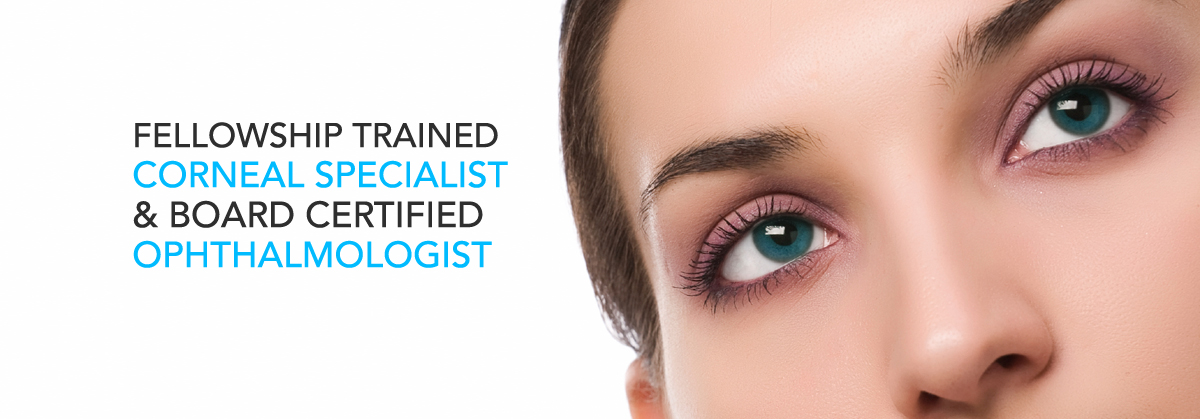Vision Correction Surgery
LASIK
LASIK is a surgical procedure used to correct vision in people who are nearsighted, farsighted or have astigmatism. Laser vision correction procedures work by reshaping the cornea, the clear window of the eye, so that incoming light is properly focused onto the retina. LASIK (laser in-situ keratomileusis) is one of a number of procedures used to reshape the cornea. Others include PRK (photorefractive keratectomy), radial keratotomy, astigmatic keratotomy and CK (conductive keratoplasty).
In a LASIK procedure, a thin flap of the cornea is initially prepared using either an instrument called a microkeratome or more recently, using a computer-controlled femtosecond laser. Dr. Kaden, working at the Barnabas Health Refractive Surgery Center, now exclusively uses the laser technique, which he feels produces better and more consistent outcomes. The flap is turned back, exposing deeper corneal tissue. Next, an excimer laser is used to remove small amounts of tissue from the deeper cornea, reshaping this surface. The final step in the surgery is a repositioning of the thin corneal flap. Preservation of corneal epithelium on the flap allows for rapid healing and recovery of vision after the surgery. Many patients find that just one day after the surgery their vision is clear enough to resume driving.
LASIK procedures are performed under eye drop anesthesia and are not painful. A mild sedative is provided shortly before the procedure to relieve patient anxiety. Patients are asked to look at a target light during the procedure and must be alert enough to be cooperative. An eyelid speculum is used to control blinking. Mechanisms built into the excimer laser system, including an eye tracker and iris recognition software ensure a centered and properly oriented laser treatment. At the end of the surgery, clear protective goggles are placed over the eyes. Antibiotic and anti-inflammatory eye drops are prescribed for a week of treatment post-operatively. The evening after surgery, patients often experience some blurring of their vision and stinging in their eyes. This can be relieved by using oral analgesics as necessary. Most patients feel much better by the next morning.
If you are considering LASIK surgery with Dr. Kaden, the first step is an evaluation to determine whether you are a candidate for the procedure. During a complementary LASIK evaluation, your refractive error (assessing nearsightedness, far sightedness or astigmatism) will be determined and you will be screened for a condition of the cornea called kerataconus. Patients with kerataconus respond to LASIK unpredictably and are generally discouraged from having the procedure. Those with very high refractive errors may be advised against having the surgery if their prescription exceeds the limits of LASIK correction. Patients with a history of herpetic keratitis or uveitis may also be excluded. If cataracts are observed, a cataract operation may be recommended as the better means of correcting the refractive error.
Patients who demonstrate no contraindications on initial screening will then be scheduled to have a comprehensive ophthalmic examination. Those who wear contact lenses must stop doing so for a week before the exam if they are soft lenses and for a month prior to the exam if they are hard lenses. During the exam the refractive error will be determined both before and after a cycloplegic dilating eye drop is administered. A careful retinal examination is performed to ensure that any retinal disease is recognized and treated before the LASIK procedure. The corneal thickness is measured with an ultrasonic pachymeter to be certain that an adequate thickness of cornea will remain undisturbed by the LASIK surgery. The surgical procedure is generally scheduled just a few days after this examination.
Dr. Kaden is a corneal specialist and has been a leader in the field of refractive surgery since the 1980s. He has more experience with LASIK surgery than all but a select few surgeons in New Jersey. Working at Pyramid Eye Center in Manhattan, he performed more than 1,000 LASIK procedures. He now works exclusively at the Refractive Surgery Center of the Barnabas Health Ambulatory Care Center in Livingston. This state-of-the-art refractive surgery center is staffed by highly trained and experienced technicians. Dr. Kaden performs all LASIK procedures personally and performs follow-up appointments with these patients in his offices. In many low-cost LASIK centers, pre- and post-operative care is delivered by optometrists or technicians. Dr. Kaden normally sees patients the day after their procedure, a week later and again at one and three months after surgery. The charges for these visits are included in the “global” surgical fee. If an enhancement procedure is necessary during the first year after surgery to fine tune the outcome, this will be performed for no additional charge. LASIK has an outstanding record of safety and success. Approximately 96% of patients achieve excellent uncorrected vision after a single laser treatment. This number increases to nearly 99% after a secondary treatment called an enhancement.
For more information about Vision Correction, or to schedule an appointment, please complete our online form or call (973) 328-6622.






